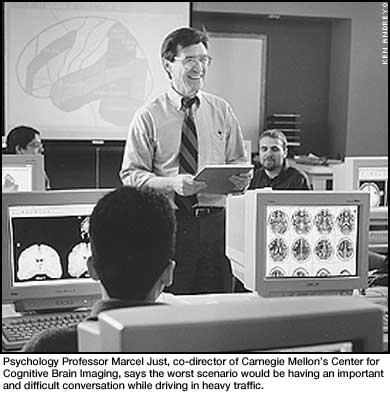|
|
||
|
|
|

Study Provides Conclusive Evidence: Cell Phones Distract Drivers
You're weaving your way through heavy traffic on the Parkway West and all of a sudden your cell phone rings with that important call you were expecting. Don't answer it, says a Carnegie Mellon research team.
By studying images of the brain at work, university scientists have scientifically proven what many of us have presumed for some time-we cannot converse on cell phones without distracting our brains from the task of driving.
In findings reported in the journal NeuroImage (www.idealibrary.com/links/toc/nimg/latest), a team led by Psychology Professor Marcel Just discovered that attending to a conversation significantly distracts the brain from processing complex visual information.
"This has direct implications for cell phone use during driving because it answers one of the classic questions about human thinking," Just said. "We've demonstrated that the human brain has a limited ability to perform two cognitive tasks concurrently under demanding circumstances, such as simultaneously conversing and driving."
In a study using non-invasive techniques to see inside the brain, scientists read sentences to 18 people while they were doing a complex visual-processing task. The researchers found that listening to someone speak consumes some of the resources that would otherwise be allocated to a complex visual information-processing task.
In fact, the amount of brain activity allocated to the visual-processing task decreased by 29% if participants were simultaneously listening to a sentence.
"The fundamental implication is that engaging in a demanding conversation could jeopardize judgment and reaction time if an atypical or unusual driving situation arose," Just said.
Just, co-director of Carnegie Mellon's Center for Cognitive Brain Imaging (www.ccbi.cmu.edu), said making cell phones "hands free" won't help.
"Use of cell phones doesn't just distract the eyes," he said. "The conversation itself also distracts the brain. Making the cell phone hands-free will not help eliminate the brain distraction."
Driving isn't the only task that suffers during mobile conversation. Both conversation and driving skills take a hit.
The research team found that the brain activity associated with language comprehension decreased by 53% if participants were simultaneously doing a complex visual- processing task. Just noted that the worst possible situation would be to have an important difficult conversation while driving in heavy traffic.
Just's team used the most recent methods of functional magnetic resonance imaging (fMRI) to measure activity in tiny portions of the brain, keeping track of how language-related activity affected the visual-processing activity. The measurements were taken every three seconds while subjects listened to sentences and compared the structures of two complex three-dimensional objects.
The results of the study show that activity in one brain system, such as the language-processing network, affect the resource availability in another system, such as the spatial-processing network.
Scientists had thought that separate brain systems might be able to work independently of each other. But Just said this study demonstrates that there is only so much that the brain can do at one time.
"Practice can make one or both tasks more automated, but there is always a limit," Just said. "Understanding spoken language is about the most automated cognitive task that exists, and driving can become fairly automated as well. But before driving is automated, in a novice driver, conversation can be extremely distracting."
The research is part of a project to develop imaging methods to measure brain workload in information-driven technology environments. The Air Force Office of Scientific Research funded the research.
Other members of the research team include Psychology Professor Patricia Carpenter, co-director of the Center for Cognitive Brain Imaging, postdoctoral research associate Timothy Keller, research assistants Lisa Emery and Holly Zajac, and Keith R. Thulborn, professor of radiology at the University of Chicago Medical Center.
Teresa Sokol Thomas
|
|
This Issue's Headlines || Carnegie Mellon News Home || Carnegie Mellon Home |
||